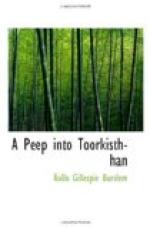to survey our country, and eventually to take possession;”
but most of them cared very little whether we came
as friends or foes: they had little to lose and
everything to gain by a
row. With a few
of the more influential chiefs the case was different;
if we had caused Dost Mahommed, the all powerful Ameer
of C[=a]bul, to become a fugitive, what chance had
they if our views led us across the Hindoo Khoosh?
Such was their mode of reasoning; but it must be confessed
that they were ignorant of the immense advantage the
rugged nature of their barren land would give them
over a regular army, and thus they were unable to
form an idea of the value of the resistance which
a few determined mountaineers might oppose. Amongst
other wild schemes, I fancy that the idea was once
entertained, or at all events the question was mooted,
of sending a force to Bokh[=a]r[=a] to procure the
release of poor Stoddart. Without dwelling upon
the enormous sacrifice of life and treasure which such
an expedition of magnitude sufficient to ensure success
would entail, I may be permitted to point out what
from personal observation I have been led to consider
as the “least impossible” route. The
line I should recommend would be the one we pursued
as far as Koollum, when the force should so shape
its route as to avoid the great sandy desert, which
extends for three hundred and fifty miles from Koollum
to Bokh[=a]r[=a], by keeping to the north, and “striking”
the Oxus, which is navigable for boats of heavy burthen
for many hundred miles above the capital. But
even on this plan we must suppose the force to have
already surmounted the thousand and one passes which
occur between Cabul and Koollum. Much has been
printed and a great deal more written and wisely left
unprinted concerning the practicability of
these routes for a modern army; it savours of a useless
truism to state, that if the government making the
attempt has resources sufficient in men, transport,
and treasure, and dwells not upon the sacrifice of
these three necessaries for an army, the thing may
be done; but I can hardly conceive any crisis in political
affairs which could render such a measure advantageous
to the party undertaking it. The advancing force
will always suffer, whether it be Russia advancing
upon India, or India advancing towards Europe.
The hand of God has fixed the tremendous barrier;
woe to him who would despise the warning.
Our route lay along the usual green vale so often
described, bounded by barren hills, over which a few
inhabitants might occasionally be seen stalking along
in their dark-coloured garments, which harmonized
with the sombre character of the country. We pitched
our tents near the little fort of M[=a]ther, about
five miles from our last encampment, and situate at
the foot of the Kara Kotul, or black pass.
Our resting place afforded nothing remarkable; and
indeed I feel that some apology is due to my readers
for the unavoidable sameness of the details of this
part of our journey; but I am in hopes that this very
defect, though it render the perusal of my journal
still heavier, will assist in conveying an accurate
idea of the nature of the country; it is not my fault
if we met with no adventures, no hairbreadth escapes,
or perilous encounters. I must once more crave
indulgence.




